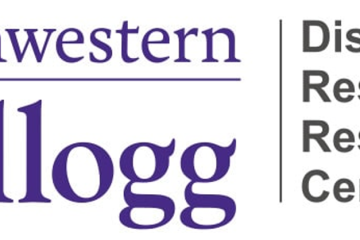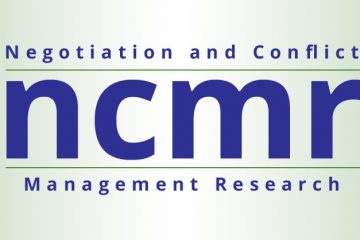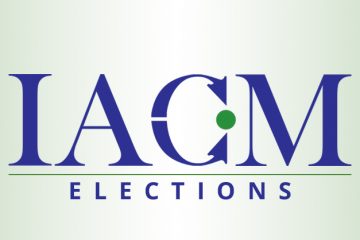NCMR: Special Issue on Conflict Coaching: State of the Art and Practice – DEADLINE EXTENDED

Negotiation and Conflict Management Research
Special Issue Call for Proposals—DEADLINES EXTENDED
Conflict Coaching: State of the Art and Practice
Proposal Submission Deadline (800-1000 words): 30 May 2025
Full Manuscript Submission Deadline (5000-8000 words): 30 October 2025
Guest Editors: Jennifer Parlamis, University of San Francisco and Geneva Centre for Security Policy and
Daniel Druckman, George Mason University, University of Queensland and Macquarie University
Overview
Conflict coaching has garnered increasing interest in recent years, emerging as a promising approach within the conflict management field (e.g., see Brinkert, 2006, 2016; Jones and Brinkert, 2008; Jones 2016; Hardy, 2022; Brigg, Druckman, Loode, & Thai, 2025). However, despite its growing attention and adoption in practice, it remains under-defined, under-theorized, and under-researched. This special issue invites scholars and practitioners to examine, clarify, and strengthen the theoretical foundations of conflict coaching, to establish and conduct empirical evaluations of its effectiveness, and to explore and share applications of conflict coaching in new contexts. By advancing scholarship and highlighting practice, this special issue aims to further solidify conflict coaching as a recognized and evidence-based approach within the broader field of conflict management and dispute resolution.
Themes and Topics
We welcome conceptual, empirical, and practitioner-oriented contributions and encourage diverse research methods and perspectives. Proposals could address (but are not limited to) the following themes:
- Definition and Theoretical Foundations
- What is conflict coaching? How do different models of conflict coaching compare and what does this reveal about the essential elements of the discipline?
- What additional theoretical lenses might enhance the conceptual foundation of conflict coaching and drive new, more comprehensive models?
- Domains and Boundaries
- When is conflict coaching the most appropriate conflict management process? What types of conflicts, and in which settings or sectors, are conflict coaching interventions best suited? How is it distinct from, or complementary to, processes such as mediation, facilitation, restorative justice, and executive coaching?
- Who qualifies as a conflict coaching professional? What competencies or training pathways need to be considered? What would a conflict coaching competency framework look like? What are the risks and benefits of professionalizing the field further?
- Research and Evaluation
- What does empirical research reveal about the efficacy of conflict coaching and the usefulness of coaching models? What are the key moderators that influence conflict coaching outcomes?
- How do clients perceive effectiveness of conflict coaching? What new research methodologies and measures of success are needed to provide a better understanding of the practice.
- Future Directions
- How might conflict coaching adapt to diverse cultural contexts to ensure broader applicability?
- What are the benefits and limitations of technology-enabled or AI-assisted conflict coaching?
- As the field evolves and expands, what are the most pressing ethical dilemmas and how should they be managed?
Submission Instructions
- Proposal submissions should not exceed 1000 words.
- Submissions should state how the paper contributes to the theoretical foundations, empirical evaluation, and/or applied practice of conflict coaching. Specifically, identify a research question or theme and how it relates to the objectives of the special issue. Briefly situate the proposal within the existing literature. For empirical studies, describe the research design, data sources, and analysis methods. For conceptual and practice-based contributions, describe the frameworks or real-world context and key insights.
- Proposals will be reviewed by the editors on a rolling basis until 30 May 2025.
- Accepted proposals will be invited to contribute a full submission.
- The NCMR submission portal can be found here. Please indicate “Special Issue” when choosing type of submission.
- Please note: Proposal acceptance does not guarantee inclusion in the special issue. Final acceptance is pending successful peer review of the full manuscript.
- Full manuscripts should be 5,000-8,000 words (excluding references).
- Final full manuscript submissions are due 30 October 2025.
For questions regarding proposal submissions, please contact Jennifer Parlamis at jparlamis@usfca.edu or Dan Druckman at dandruckman@yahoo.com.
References
Brigg, M., Druckman, D., Loode, S., & Thai, H.A. (2025). The conflict coaching challenge:
design and evaluation of an online conflict coach. International Journal of Conflict Management. 36(2): 320-347.
Brinkert, R. (2006). Conflict Coaching: Advancing the conflict resolution field by developing an
individual disputant process. Conflict Resolution Quarterly, 23(4): 517-528.
Brinkert, R. (2016). State of Knowledge: conflict Coaching Theory, Application, and Research.
Conflict Resolution Quarterly. 33(4): 383-410.
Hardy, S. (2022). Conflict Coaching Fundamentals: Working with Conflict Stories. Routledge:
New York.
Jones, T.S. (2016). Mediation and Conflict Coaching in Organizational Dispute Systems, Bolen,
K., Euwema, M. and Munduate, L. (Eds.). Advancing Workplace Mediation Through
Integration of Theory and Practice. 89-110.
Jones, T.S. & Brinkert, R. (2008). Conflict Coaching: Conflict Management Strategies and Skills
for the Individual. Sage Publications: Los Angeles.


